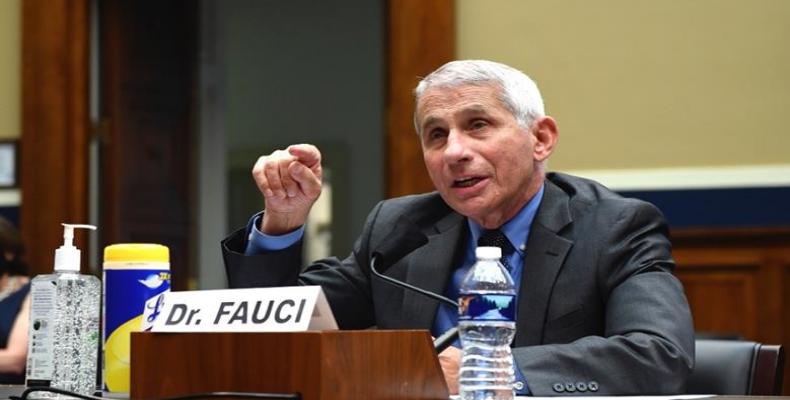Washington, June 24 (RHC)-- Dr Anthony Fauci, the top U.S. infectious disease expert, has told a House Committee there could be a COVID-19 vaccine later this year or early in 2021, but warned that the next few weeks will be critical to tamping down coronavirus hot spots around the country.
Fauci and other top health officials also said they have not been asked to slow down testing for coronavirus, a controversial issue after President Donald Trump said last weekend he had asked them to do just that because it was uncovering too many infections. Trump said earlier in the day that he was not kidding.
"We will be doing more testing," Fauci, the government's top infectious disease expert, told a House committee on Tuesday. Fauci testified before a House of Representatives committee -- along with the heads of the Centers for Disease Control and Prevention, the Food and Drug Administration, and a top official at the Department of Health and Human Services.
"We've been hit badly," Fauci said. He said he was "really quite concerned" about rising community spread in some states, including Arizona, which Trump was visiting on Tuesday to view the construction of a border wall and for a rally at a megachurch. "The next couple of weeks are going to be critical in our ability to address those surges," Fauci said.
Since Fauci's last appearance at a high-profile hearing more than a month ago, the United States is emerging from weeks of stay-at-home orders and business shutdowns.
Reopening businesses and loosening restrictions have been done in an uneven way, with some states far less cautious than others. A trio of states with Republican governors who are bullish on reopening -- Arizona, Florida and Texas -- are among those seeing worrisome increases in cases.
Twenty-five US states reported more new cases last week than the previous week, including 10 states that saw weekly new infections rise more than 50 percent, and 12 states that posted new records, according to the analysis of data from The COVID Tracking Project, a volunteer-run effort to track the outbreak.
Texas reported one of the largest rises in new cases at 24,000 for the week ended June 21, an increase of 84 percent from the previous week. The number of COVID-19 tests that came back positive in the state rose from 7 to 10 percent.
New cases in Florida rose 87 percent last week to almost 22,000, with the state's positive test rate nearly doubling to 11 percent.
Arizona reported 17,000 new cases, a 90 percent increase, with 20 percent of tests coming back positive, according to the analysis.
Fauci has recently warned that the United States is still in its first wave of the pandemic, and he has continued to urge the American public to practice social distancing. And, in a recent ABC News interview, he said political demonstrations such as protests against racial injustice are "risky" to all involved.
Asked if that applied to Trump rallies, he said it did. Fauci continues to recognize widespread testing as critical for catching clusters of COVID-19 cases before they turn into full outbreaks in a given community.
About 2.3 million in the U.S. have been infected in the pandemic, and more than 120,000 have died, according to data from Johns Hopkins University.
As head of the National Institute of Allergy and Infectious Diseases, Fauci will be joined before the House Committee on Energy and Commerce by CDC Director Dr Robert Redfield, FDA chief Dr Stephen Hahn and the head of the US Public Health Service, Admiral Brett Giroir.


